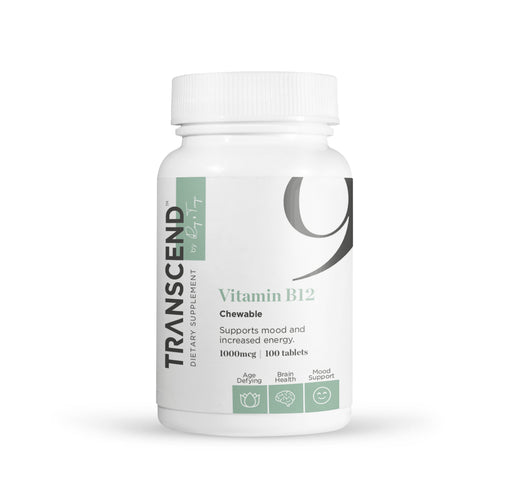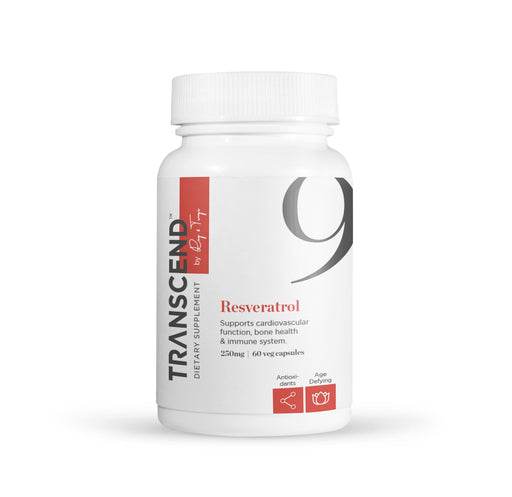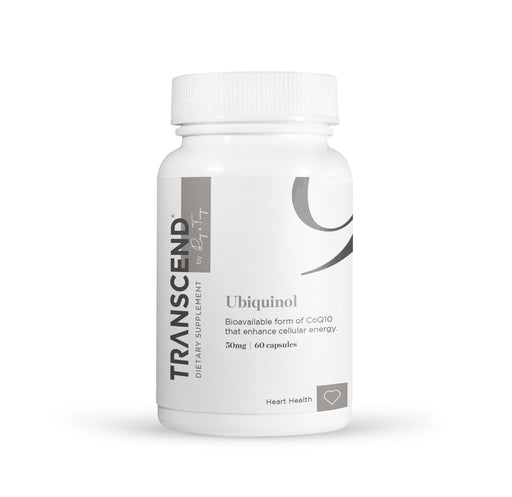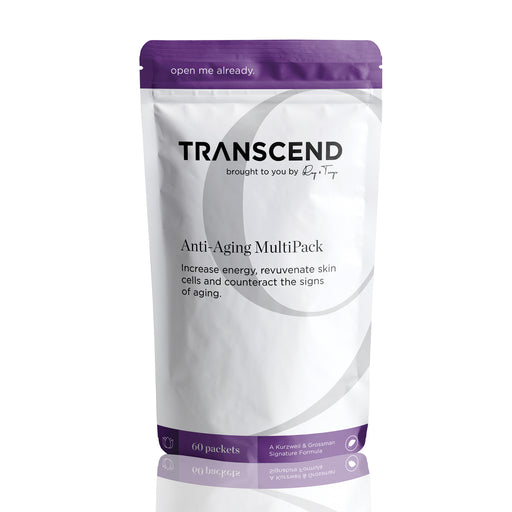Login

Vitamin B-12, Sublingual
Increased energy Improve mood Fight fatigue Common deficiency Better absorption Vitamin B12 (also called cobalamin) is one of eight water-solu...
View full details
As you might imagine, Ray Kurzweil gets asked a lot about his supplement regime. The questions generally go something like this: “Ray, is it true you take 250 pills a day?”, quickly followed by, “What are you taking to keep yourself healthy and youthful for the Singularity?”.
Due to concerns around privacy, and individual needs varying so widely, for years, Ray kept his answers close to his chest. What we were able to gather came from his books, Fantastic Voyage and Transcend. More recently, Ray has opened up, providing personal information around his supplement regime and lifestyle choices, and even allowing interviewers to film him at his family home. If you’ve seen interviews Ray gave during this time, you’ve likely heard Ray discuss his top 3 supplement choices; Phosphatidylcholine, Resveratrol and Ubiquinol. As such, these three supplements are found in our Anti-Aging Multipack, and across our website, along with dozens of other supplements Ray takes discusses in his books.
What about the remaining 97 pills that make up Kurzweil’s daily regime? Inquiring minds want to know.
First, let’s cover the three supplements listed above:
Beyond these three supplements, Ray––under a doctor’s close supervision––takes an additional 100(ish) pills per day, along with weekly IV injections. Below we’ve broken down Ray’s regime by category.
DISCLAIMER. As always, we strongly recommend consulting a doctor before taking any supplements. Your personal regime should align with your individual needs and personal goals. There are no magic pills, which is why Ray and Terry continually stress the importance of making informed choices based on each individual's specific needs and situation. Without further ado, let’s dig in.
Supportive––but not conclusive––research shows that consumption of EPA and DHA omega-3 fatty acids may reduce the risk of coronary heart disease.2,3,4 One softgel of EPA/DHA provides 300 mg of combined EPA/DHA omega-3 fatty acids.
GABA. GABA is a neurotransmitter that blocks impulses between nerve cells in the brain. Low levels of GABA may be linked to:
Anxiety and/or mood disorders
Epilepsy
Chronic pain
Researchers suspect that GABA may boost mood or have a calming, relaxing effect on the nervous system.
Glyceryl phosphatidylcholine. A chemical released when a fatty acid found in soy and other plants breaks down. It is used as medicine. In Europe,Glyceryl Phosphatidylcholine (AKA alpha-GPC) is often prescribed by a physician to treat Alzheimer’s disease, though here in the US, alpha-GPC is only available as a dietary supplement, mostly in products promoted to improve memory.
Melatonin. Melatonin is a naturally produced hormone made by the brain’s pineal gland. It’s purpose is to help your brain know when it’s time to sleep or wake up.
Nextrutine. A supplement that functions as a COX-2 inhibitor, fighting inflammation that spreads throughout the body, though without the many drawbacks of various COX-2 inhibitor drugs.
Quercetin. This plant pigment (flavonoid) is found in many plants and foods, like onions, red wine, apples, berries, etc. Quercetin is most commonly used to treat conditions of heart and blood vessels and prevent cancer.
DMPS. Chemical compounds and proteins are injected into the blood to treat conditions such as lead toxicity.
EDTA. Intravenous injections that bind heavy metals and minerals to the blood so they can be excreted in the urine.
Acidophilus bifidobacterium. Probiotics that promote favourable gut flora that support intestinal/gastrointestinal health and overall intestinal health
Betaine HCL. Previously, Betaine HCL was sold over the counter as a “stomach acidifier and digestive aid”. Today, it’s sold as a dietary supplement for that same benefit, as well as treat low levels of potassium, hay fever, asthma, and to protect the liver.
Fish protein. Polyunsaturated fatty acids (PUFA) that are essential for health and are required for some functions in the body. Research studies suggest that omega-3 fatty acids may help in a wide range of diseases, including rheumatoid arthritis, asthma, depression, cancer, ADHD, cardiovascular disease and various autoimmune diseases.
Fructooligosaccharides. This carbohydrate is often used as an alternative sweetener because it carries less calorie than sugar.
Gentian root. This herb is made from root and is treats digestion issues loss of appetite, fullness, intestinal gas, diarrhea, gastritis, heartburn, and vomiting. It is also used for fever, hysteria, diabetes, and high blood pressure. Some people use gentian to prevent muscle spasms, treat parasitic worms, start menstrual periods, and as a germ killer.
l-glutamine. A naturally-occurring amino acid often used to treat side effects of medical treatments, like diarrhea and nerve pain. It’s also used to treat conditions like stomach ulcers, Crohn’s disease and as a mood regulator.
N-acetyl-d-glucosamine. This chemical is taken for osteoarthritis and inflammatory bowel disease (IBD), including ulcerative colitis and Crohn's disease. Additionally, N-acetyl glucosamine can be applied to the skin to reduce dark spots caused by aging and sun exposure.
Peppermint. In case you didn’t know, peppermint oil is one of the most highly recommended natural cures for Irritable Bowel Syndrome (IBS) symptoms like gas, bloating, indigestion, pain, and irregularity.
Pepsin. An enzyme produced in the stomach that breaks down proteins into smaller peptides, helping digest the proteins in food.
Bilberry extract. A berry extract that has been reported to support night vision, though lacks scientific findings to back these claims.
Lutein. This carotenoid vitamin is is found in broccoli, spinach, kale, corn, kiwi fruit, grapes, squash, orange juice zucchini and squash. Lutein is often taken to prevent eye diseases, such as age-related macular degeneration, cataracts, and retinitis pigmentosa.
DHEA. A hormone produced by your body's adrenal glands often taken to improve sex drive and fight aging.
Chrysin. This flavonoid occurs naturally in plants and is used for bodybuilding, anxiety, inflammation, gout, HIV/AIDS, erectile dysfunction (ED), and baldness; and for preventing cancer.
Ginger. Several studies in rats have found ginger has positive effects on testosterone levels and sexual function. In one study, rats who were given ginger doubled their testosterone levels.
Indole-3-carbinol. A substance commonly found in vegetables that’s used to increase testosterone and for cancer prevention.
Nettle. This testosterone-boosting plant works by inhibiting SHBG (Sex Hormone Binding Globulin), making testosterone more bioavailable in the body
PtC.
Testosterone (prescription).
Note: AGEs or advanced glycated end products form when sugar corrupts a cellular component, such as a protein molecule, causing macromolecular damage. Anti-aging researchers called geroscientists link the build-up of AGEs in our aging bodies to a variety of diseases.
Alpha lipoic acid. Lipoic is a naturally produced acid is found in the body and synthesized by plants and animals. It effectively helps turn glucose into “fuel” for the body.
Carnosine. This naturally produced amino acid that concentrates when muscles are working. Carnosine is used to slow aging and treating complications stemming from diabetes, like nerve damage, eye disorders and kidney issues.
n-acetyl-carnitine. Acetyl-L-carnitine is an amino acid (a building block for proteins) that is naturally produced in the body. It helps the body produce energy. It is important for heart and brain function, muscle movement, and many other body processes.
Vitamin B-6. Also known as ‘pyridoxine’, as part of the vitamin B complex family, B-6 is most well known for helping maintain a healthy metabolism, skin health, eye health, nerve function, liver function, and boosting energy.
Folic acid. This form of vitamin B-9 can dissolve in water, and is vital to making red blood cells, as well as aid cell division and growth, support brain health, repair DNA and combat age-related hearing loss.
Beta-sitosterol. Found in fruits, vegetables, nuts, Beta-sitosterol is known to modulate immune function, inflammation, and pain levels by controlling the production of inflammatory cytokines.
Green tea extract. Green tea extract appears to improve exercise performance and enhancing recovery by reducing cellular damage and delaying muscle fatigue.
L-theanine. An amino acid found in green tea, L-theanine is often used to treat anxiety, high blood pressure, alzheimer’s disease and increasing the effect of cancer drugs.
Phosphatidylserine. This chemical is commonly manufactured from cabbage or soy and is used to maintain cell functioning. It’s often used to improve mental function.
Chromium. “Trivalent chromium” is an essential trace element that forms a compound to boost the effects of insulin and lower glucose levels.
Gymnema sylvestra. This woody climbing shrub native to India and Africa. It’s leaves are used to treat diabetes, for weight loss, and other conditions.
Metformin (prescribed for Ray’s type 2 diabetes). This prescribed drug for diabetes also helps decrease the risk of cancer when taken in small doses.
Grapefruit powder. Grapefruit has long been known cut help support weight loss and cholesterol reduction.
Guggulipid ( aka Gugulipid or Guggul). This flowering plant is commonly used for the maintenance of skin health and to maintain a healthy weight, digestive system and healthy cholesterol profile.
Lecithin. Lecithin is a fat that’s essential in the cells of the body. It can be found in many foods, including soybeans and egg yolks. In addition to cholesterol support, it’s taken to treat memory disorders like dementia and Alzheimer’s disease. It is also used for treating gallbladder disease, liver disease, certain types of depression, anxiety, and a skin disease called eczema.
Oat Bran. Oat bran is taken for weight management, cholesterol support, heart health, and even for diabetes management.
Plant sterols. Along with stanols, plant sterols are substances that occur naturally in many grains, vegetables, fruits, nuts, and seeds. They have powerful cholesterol-lowering properties
Policosanol. Policosanol is a chemical most often obtained from sugar cane, and other plants, like wheat. It’s most commonly used to promote cholesterol and reduce leg pain.
Psyllium. Psyllium is a form of fiber made from the husks of the Plantago ovata plant’s seeds. It sometimes goes by the name ispaghula. In addition to cholesterol support, it’s used for leg pain.
Atorvastatin. A prescription drug used to lower LDL cholesterol
Vitamin B-3. Also called ‘Niacin’, this vitamin is taken to raise HDL cholesterol.
Coenzyme Q10. This powerful natural antioxidant is synthesized by the body and found in many foods.
Daily multivitamin. Containing multiple vitamins and minerals.
Pyridoxal-5-phosphate. Pyridoxal Phosphate is the active form of vitamin B6 and a coenzyme for many pyridoxal phosphate (PLP)-dependent enzymes.
Vitamin B-12 shots (megadose). These super-doses of B-12 are generally taken as treatment against toxification and nerve disease, or when refilling the B-12 body store.
L-carnitine. This amino acid is used for heart and blood vessel conditions, such as heart-related chest pain, congestive heart failure (CHF), heart complications of a disease, heart attack, leg pain caused by circulation problems, and high cholesterol.
Vitamin D. Vitamin D is a nutrient that helps absorb calcium. Together, Calcium and vitamin D work to maintain healthy bones and teeth. Vitamin D also helps muscles, nerves and the immune system work properly. Recent research has shown that vitamin D may be linked to lowering the risk of diseases such as multiple sclerosis and some cancers.
Lycopene. This naturally occurring chemical that gives fruits and vegetables a red color. It is one of a number of pigments called carotenoids. Lycopene is taken to prevent heart disease, atherosclerosis; and cancer of the prostate, breast, lung, bladder, ovaries, colon, and pancreas. It’s also used for treating HPV infection; a major cause of uterine cancer.
N-acetyl-l-cysteine. This low-cost compound helps in preventing coughing, wheezing, and thick phlegm associated with cold and flu.
Silymarin (flavonoid). Oxidative stress is one of the key players in skin carcinogenesis, and therefore identifying nontoxic strong antioxidants to prevent skin cancer. It also helps with liver health.
Grape seed extract. Evidence suggests grape seed extract benefits a number cardiovascular conditions. Grape seed extract may help with a type of poor circulation (chronic venous insufficiency) and high cholesterol. Grape seed extract also reduces swelling caused by injury and helps with eye disease related to diabetes.
Echinacea. This popular herb is commonly taken to combat the flu and colds.
Garlic. Garlic is a highly nutritious plant that’s low in calories. 1-ounce (28-grams) of garlic contains:
Manganese: 23% of the RDA
Vitamin B6: 17% of the RDA
Vitamin C: 15% of the RDA
Selenium: 6% of the RDA
Fiber: 0.6 gram
Decent amounts of calcium, copper, potassium, phosphorus, iron and vitamin B1
Various Herbs. Various other herbs are worked into Ray’s diet to support overall health.
Vinpocetine. This man-made chemical takes a considerable amount of work to create, and is used to improve blood flow to the brain, enhancing memory and preventing Alzheimer’s disease. It’s also used for conditions that harm learning, memory, and information processing skills as people age.
Alkaline Water. Alkaline water is water that’s less acidic than tap water, meaning it’s rich in alkalizing compounds, like calcium, silica, potassium, bicarbonate, and magnesium.
Glutathione. Glutathione is a substance naturally produced by the liver, but is also found in fruits, meats and vegetables. People take glutathione to treat cataracts and glaucoma, preventing aging, treating or preventing alcoholism, asthma, cancer, heart disease, hepatitis, liver disease, diseases that weaken the body’s defense system, memory loss, Alzheimer’s disease, osteoarthritis, and Parkinson’s disease.
Nicotinamide riboside (NR). NR is a unique form of vitamin B3, which is an “NAD precursor.” It effectively increases the health of our mitochondria (the powerhouses of each cell). Similar to CoQ10 and PQQ, nicotinamide riboside supplements boost both physical and cognitive function.
We appreciate not everyone can stomach shoveling this amount of supplementation into their body. Clearly, adapting one’s lifestyle to counter the effects of aging requires incredible commitment. In Ray’s case, his rigorous regime is made more difficult by his busy travel, speaking and work schedule.
Regardless of how busy you are, or how deep you’re willing to dive into the supplementation waters, it’s important to know there are actionable steps you can take today to promote longevity.
If you’re looking for a place to begin your journey, fill out this questionnaire to receive personalized longevity supplements, designed for your specific needs.

Increased energy Improve mood Fight fatigue Common deficiency Better absorption Vitamin B12 (also called cobalamin) is one of eight water-solu...
View full details
Combat internal aging Protect cells from radiation damage Increase antioxidant capacity Take with lecithin for better absorption Optimal dose for...
View full details
2022 update: Future batches of this product will use a Ubiquinol product that is a greenish capsule rather than a red softgel Bioavailable form o...
View full details
A Kurzweil + Grossman Formula Continued Synergy between Science and Convenience Convenient dosage packets Top anti-aging products Increase energy...
View full details
Leave a comment